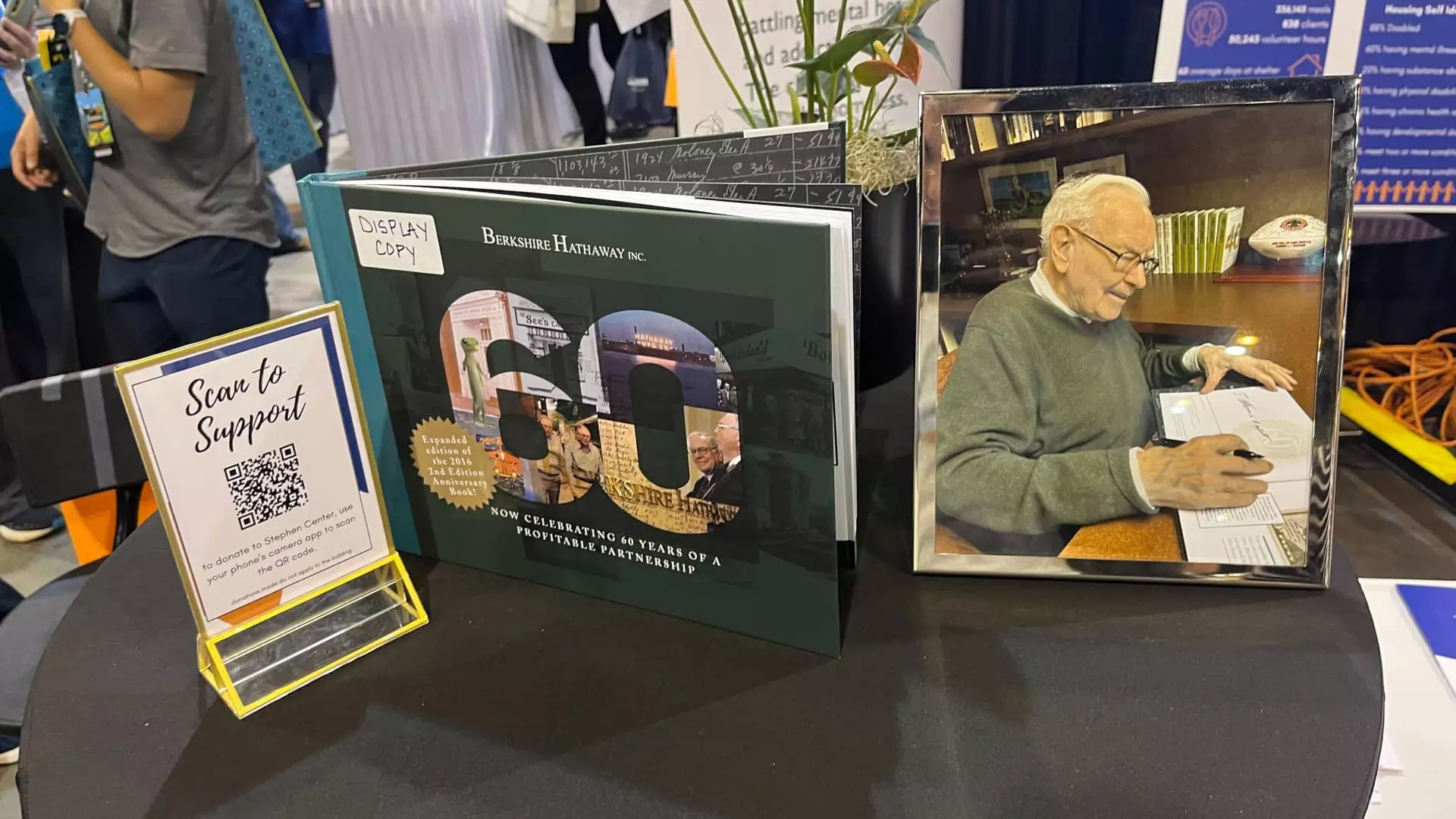In a blend of fervor and philanthropy, the recent Berkshire Hathaway annual meeting revealed not just a financial strategy session but the heart of goodwill embodied by its legendary CEO, Warren Buffett. The prelude to this event was marked by transpacific wire transfers and bids ascending into the six figures, illustrating how the allure of claimed memorabilia could steer shareholders toward a cause far greater than their individual interests. The auction of signed books, intended to support the Stephen Center in Omaha—a local shelter tackling homelessness and addiction recovery—highlighted how a simple act of charity can mobilize global investors to partake in giving back to their community.
The fervent atmosphere surrounding this auction is both an inspiring spectacle and a stark reminder of the potential disparity in wealth and philanthropy. While the highest bid soared to an impressive $100,000, such figures illuminate a curious intersection of wealth and societal responsibility. Attendees, drawn by the opportunity to bid on memorabilia authenticated by Buffett himself, were not merely collectors in pursuit of a value-enhancing item but were unwitting participants in a dynamic display of communal support. It’s challenging not to notice, however, the possible dilution of the charity’s cause in the glittering chase for possessions linked to a millionaire mogul.
The Consequences of Celebrity Philanthropy
Buffett’s decision to match each dollar raised during the auction unequivocally demonstrates the power of celebrity-driven philanthropy. While such gestures deserve applause, one must ponder: does this encourage a culture that relies on a wealthy few to bear the brunt of societal support? In this case, the auction generated over $1.3 million, a remarkable sum that highlights the potential for impact. However, it raises enduring questions about systemic support for charitable organizations, particularly in a landscape where local shelters are increasingly overstretched.
Chris Knauf, CEO of the Stephen Center, expressed heartfelt gratitude for Buffett’s efforts, showcasing an admirable cooperation between a giant of finance and a local charitable cause. Nonetheless, one cannot escape the feeling that such sporadic, event-driven philanthropy can unintentionally mask deeper systemic issues. The shelter’s increasing need amid a burgeoning homeless population hints at an urgent call for more profound, sustained engagement with societal challenges, transcending beyond extraordinary fundraising events.
The Personal Connections that Drive Generosity
Among the bidders, individuals like Matthew Rodriguez, who saw a once-in-a-lifetime opportunity to acquire a signed Buffett book, embody the personal connection many feel towards the righteous causes championed by Buffett. Rodriguez articulated not only a desire to hold a piece of investment history but also a commitment to understanding precisely how his contributions impact the community. Such narratives of personal engagement indubitably ground the monetary donations in more meaningful stories that resonate beyond the price tags.
However, one must consider the stark contrast of privilege showcased in these bidding wars. For many families struggling to make ends meet, the notion that charity observes dollar amounts before addressing need can be a hard pill to swallow. It’s essential to recognize that while philanthropy rooted in personal wealth can catalyze positive change, the need for community-driven solutions should be the ultimate goal. This dynamic leads to the troubling question: is genuine change fostered by ordinary people, or does it rely predominantly on the heroic acts of a few wealthy benefactors?
Raising Awareness: More Than Just Fundraising
Critically, the funds raised during the event exceed mere transaction values; they serve as a clarion call to the community about the pressing conditions faced by the unhoused population around Omaha. The Stephen Center’s current push to renovate spaces and construct facilities for women and children highlights a tangible impact from the auction, redirecting the wealthy bidders’ passion into potential life-changing support for individuals facing hardship.
This underlying mission, however, invites scrutiny about general community awareness and action. While the $45,000 pledged outside the auction from well-meaning shareholders indicates a swell of support, one cannot ignore the need for consistent public engagement rather than sporadic support driven solely by spectacle. The surge in awareness that an event like this can create is commendable, yet the sustainability of that awareness must be examined. Will these once-enthusiastic shareholders maintain their engagement long after the excitement of the bidding ends?
In the end, Buffett’s actions during his final phase as CEO position him not just as a business titan but a model philanthropist, raising questions about the interplay between wealth, responsibility, and the collective impact of community. While the profits generated from libraries of memorabilia may serve a higher cause, the broader narrative should focus on continuous commitment to addressing societal needs long after larger-than-life figures fade from the spotlight. In taking these events into consideration, awareness of how systemic support mechanisms for causes like homelessness can evolve from celebrity philanthropies is paramount to fostering lasting societal change.

